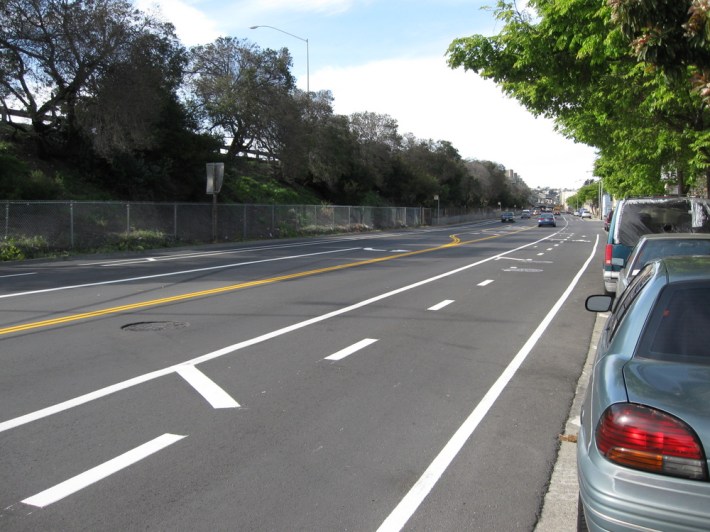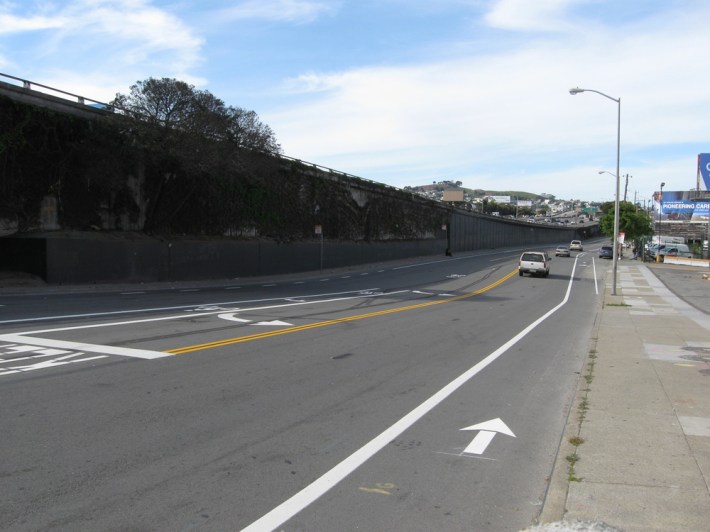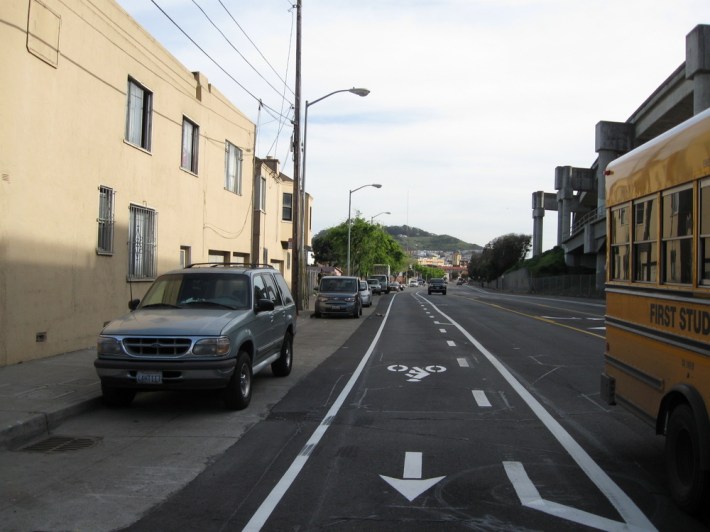
The SFMTA extended the buffered bike lanes on Bayshore Boulevard earlier this month from Silver Avenue south to Paul Avenue, reducing four traffic lanes to two. The street now provides a calmer, safer bicycling link for Bayview residents all the way up to where Bayshore ends, at Cesar Chavez Street and the "Hairball" freeway interchange.
The bike lanes were originally slated to go on San Bruno Avenue, which runs parallel to Bayshore on the opposite side of 101, according to the SFMTA website:
This project was originally planned for San Bruno Avenue as part of the 2009 San Francisco Bicycle Plan. However, due to potential conflicts with planned Muni improvements along San Bruno Avenue, the SFMTA has determined that a more appropriate north-south bicycle route between Paul and Silver Avenues would be Bayshore Boulevard because it connects directly with existing bikeways north of Silver Avenue and does not conflict with transit operations.
Traffic analysis was completed that showed that there was not a need to keep four travel lanes.

Yet the benefits of the bike lanes and taming speeds on a traffic sewer are largely lost at the "Alemany Maze" -- the tangle of looping freeway ramps where 101 and 280 intersect. As D10 Watch author Chris Waddling pointed out, the interchange presents "outright hostile conditions for pedestrians and cyclists," cutting off access between neighborhoods for those traveling without a car:
Say you want to get from Bayview to a Glen Park BART by bike. Riding the new lanes on Bayshore are now great, but get from Bayshore to the separated bike lane on Alemany at Putnam, and you're sharing the road with freeway-bound vehicles.
Or say you want to walk from the Portola to the Alemany Farmer's Market on Saturday morning. You either cross illegally at the top of San Bruno Ave or walk an extra 1/4 mile each way to get to the light at Putnam. And if you need one, it's too bad there's no ADA ramp for you when you get there.
The benefits of increasing pedestrian and bike access in the area are many: reduced car traffic on Saturday mornings in and around the Alemany Farmers Market; safer access to the Farmers Market for Portola residents; greater access to amenities in the Portola by residents of Bernal Heights; safer access to BART for Portola residents; an opportunity for beautification of the median.

Waddling has one idea for how to improve the connection: Legitimize a dirt path that locals currently use to traverse a triangle-shaped median in the middle of the maze. Currently, people on foot and bike must dodge three lanes of freeway-bound drivers while crossing each side of Alemany Boulevard, which splits into a road couplet around the triangle. The new path would also need crosswalks across Alemany on either side of the triangle, along with a traffic signal or pedestrian-activated beacon. These would improve both safety and access:
Pedestrians would be able to safely access the farmer’s market from the Portola, reducing trips to the market by car, easing parking, pollution, and congestion in residential Bernal Heights.
Alemany's buffered, post-separated bike lanes also need to be extended, Waddling says. The bike lanes, striped in 2011, suddenly disappear as they approach to the freeway interchange -- just where they're needed most. Waddling says removing lanes to make room for buffered bike lanes would also help calm traffic and make the new crosswalks safer to use.
Waddling noted that the safety improvements could add travel time for drivers. But calming traffic at hostile freeway interchanges, like the Alemany Maze and the Hairball, is key to providing safe, dignified connections for people walking and biking. Until that happens, even SF’s most transformative street safety redesigns will be rendered useless.






